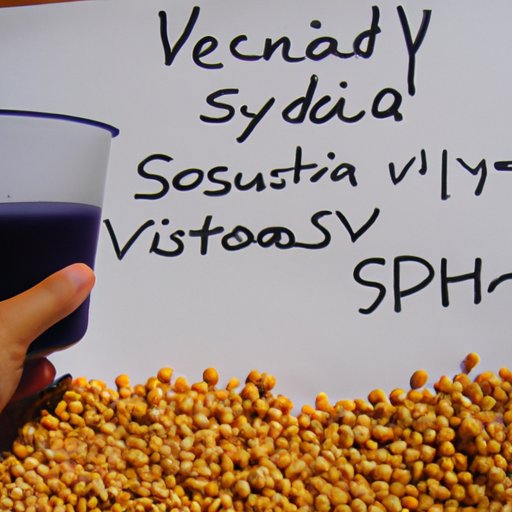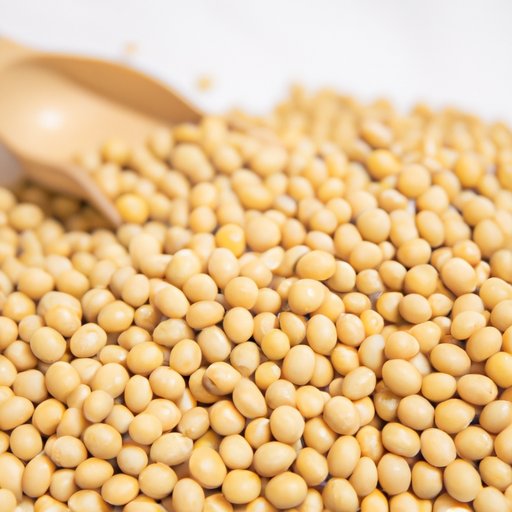Introduction
Soybeans are a type of legume that have been cultivated for centuries in Asia. They are now widely used as an ingredient in many foods, such as tofu, tempeh, miso, and edamame. While soybeans can be a healthy addition to your diet, some people worry about their potential negative impacts on health. This article will explore the pros and cons of eating soybeans and examine what research has to say about them.

Examining the Pros and Cons of Soybeans for Human Health
Soybeans are high in protein, fiber, vitamins, and minerals, making them a nutritious food choice. The benefits of eating soybeans include:
- High in essential amino acids
- Rich in omega-3 fatty acids
- Low in saturated fat
- Good source of antioxidants
- May help lower cholesterol levels
- May reduce risk of heart disease
However, there are also some potential risks associated with eating soybeans. These include:
- May contain compounds that block absorption of certain nutrients
- May increase estrogen levels in men
- May interfere with thyroid hormone levels
- May cause digestive problems in some people
- May contain high levels of aluminum

Exploring the Impact of Soybean Consumption on Cardiovascular Disease Risk
Studies have shown that eating soybeans may help lower cholesterol levels and reduce the risk of heart disease. One study found that replacing animal proteins with soy proteins was associated with a 5% reduction in total cholesterol levels. Another study found that consuming two servings of soy products per day was associated with a 21% lower risk of cardiovascular disease.
Investigating the Potential Benefits and Risks of Eating Soybeans
Soybeans are an excellent source of plant-based protein and essential nutrients. A single cup of cooked soybeans provides 20 grams of protein, 14 grams of fiber, and more than 30% of the daily recommended intake of iron, magnesium, and phosphorus. In addition, soybeans are a good source of vitamins A, B6, and K, as well as folate and potassium.
However, soybeans also contain compounds called phytoestrogens that can block the absorption of other nutrients and interfere with hormone levels. Soybeans also contain high levels of aluminum, which can accumulate in the body over time and cause health problems. For these reasons, it’s important to monitor your consumption of soybeans and talk to your doctor if you have any concerns.
The Pros and Cons of Soy: Is it Healthy or Unhealthy?
Overall, research suggests that eating soybeans can provide some health benefits, such as reducing cholesterol levels and improving heart health. However, there are also potential risks associated with eating too much soy, such as blocking nutrient absorption and interfering with hormone levels. As such, it’s important to be mindful of your soy intake and talk to your doctor if you have any concerns.
According to the American Heart Association, “Moderate amounts of soyfoods can be part of a healthy diet.” The organization recommends limiting soy consumption to two to three servings per day, as this is enough to get the benefits without increasing the risks associated with overconsumption.
What Do Nutrition Experts Say About Eating Soybeans?
Nutrition experts recommend eating soybeans in moderation and avoiding processed soy products, such as soy burgers and soy hot dogs. These products are often highly processed and can contain unhealthy additives, such as sugar and preservatives.
Experts also suggest avoiding eating soybeans with other foods that can interfere with nutrient absorption, such as tea, coffee, and calcium supplements. Additionally, if you have an existing health condition, it’s best to talk to your doctor before adding soybeans to your diet.
Are Soybeans Good or Bad for You?
The answer to this question depends on who you ask. Some people believe that soybeans are beneficial for health, while others believe they can be harmful. Ultimately, it’s important to consider both the potential benefits and risks of eating soybeans and talk to your doctor if you have any concerns.
For most people, eating moderate amounts of soybeans, such as two to three servings per day, can provide health benefits without increasing the risk of side effects. However, if you have a pre-existing health condition, it’s best to talk to your doctor before adding soybeans to your diet.

Debunking Common Myths About Soybeans and Health
There are many misconceptions about soybeans and health. One common myth is that soybeans can increase breast cancer risk. However, studies have found no link between eating soybeans and increased breast cancer risk.
Another myth is that soybeans can lead to infertility. Again, research does not support this claim. In fact, some studies have found that eating soybeans may improve fertility in women.
It’s important to separate fact from fiction when it comes to soybeans and health. Talk to your doctor if you have any questions or concerns about eating soybeans.
Conclusion
Soybeans are a nutritious food choice that can provide a variety of health benefits, such as lowering cholesterol levels and reducing the risk of heart disease. However, there are also potential risks associated with eating too much soy, such as blocking nutrient absorption and interfering with hormone levels. As such, it’s important to be mindful of your soy intake and talk to your doctor if you have any concerns.
(Note: Is this article not meeting your expectations? Do you have knowledge or insights to share? Unlock new opportunities and expand your reach by joining our authors team. Click Registration to join us and share your expertise with our readers.)
